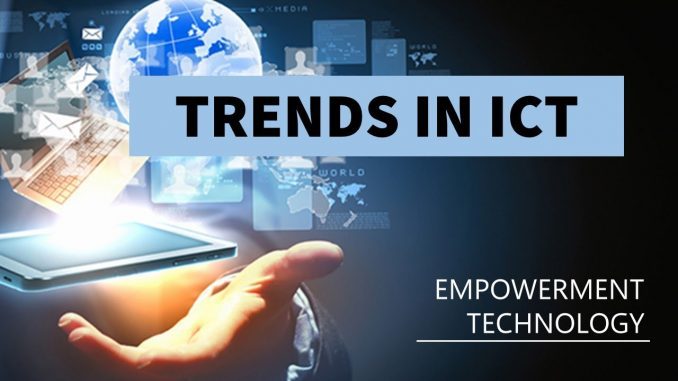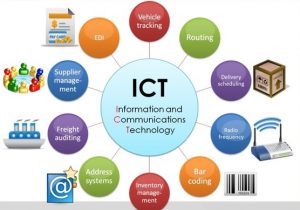
Sri Lanka Schools AL ICT New Trends and Future (ICT Grade 13 Lesson 13 ). After studying this chapter, you will be able to understand the following:
- 13.1 Explores new trends and future directions in computing
- 13.2 Explores the fundamentals and applications of agent technology
- 13.3 Analyzes the existing models of computing and proposes a new model
You can get better practical knowledge by watching the given videos related to the topics mentioned in the syllabus of this lesson AL ICT New Trends and Future. By clicking on the relevant categories, you can see the description of the lesson related to the topic
? Learning Video Option 1 – Sinhala Medium – Play List Included 3 Videos with Question discussion
Given below is an AL ICT resources Book prepared in relation to your syllabus.
For an enlarged view of the resources Book, ? Click Here
Related resources and links to this lesson
Resource Book Lesson Note Download Questions Syllabus
AL ICT New Trends and Future
As technology continues to evolve at a rapid pace, the field of Information and Communication Technology (ICT) has become an integral part of our lives. In Sri Lanka, the Advanced Level Information and Communication Technology (AL ICT) curriculum plays a vital role in preparing students for the ever-changing digital landscape. This article explores the new trends and future directions in computing, delves into the fundamentals and applications of agent technology, and analyzes existing computing models while proposing a new model.
Table of Contents
- Introduction
- The Evolving Landscape of Computing
- 2.1 The Impact of Artificial Intelligence (AI)
- 2.2 Big Data and Analytics
- 2.3 Cloud Computing
- 2.4 Internet of Things (IoT)
- 2.5 Cybersecurity
- Understanding Agent Technology
- 3.1 Definition and Concept
- 3.2 Applications of Agent Technology
- 3.3 Challenges and Future Prospects
- Rethinking Computing Models
- 4.1 Traditional Computing Models
- 4.2 The Need for a New Computing Model
- 4.3 Proposed New Computing Model
- Conclusion
- FAQs
1. Introduction
The AL ICT curriculum in Sri Lanka equips students with the necessary skills to navigate the dynamic world of technology. To stay ahead in this rapidly evolving field, it is crucial to explore the new trends and future directions shaping the ICT landscape.
2. The Evolving Landscape of Computing
2.1 The Impact of Artificial Intelligence (AI)
Artificial Intelligence has revolutionized various industries, and its impact on computing is undeniable. From machine learning to natural language processing, AI has opened doors to new possibilities. Sri Lanka’s AL ICT curriculum focuses on developing a deep understanding of AI and its applications.
2.2 Big Data and Analytics
The proliferation of data has given rise to the need for effective management and

analysis. Big Data and Analytics play a significant role in leveraging the vast amounts of information available today. Students studying AL ICT gain insights into the world of data science and learn how to extract valuable insights from complex datasets.
2.3 Cloud Computing
Cloud Computing has transformed the way businesses and individuals store, process, and access data. The AL ICT curriculum in Sri Lanka emphasizes cloud technologies, ensuring students are well-versed in utilizing cloud platforms and understanding their implications.
2.4 Internet of Things (IoT)
The Internet of Things connects various devices and enables them to communicate and share data. AL ICT students explore the potential of IoT and its applications in various sectors, including healthcare, transportation, and agriculture.
2.5 Cybersecurity
With the increasing dependency on technology, cybersecurity has become a critical concern. AL ICT curriculum equips students with the knowledge and skills to protect systems, networks, and data from potential threats.
3. Understanding Agent Technology
3.1 Definition and Concept
Agent technology involves the development of intelligent agents capable of autonomous decision-making and problem-solving. AL ICT students delve into the concepts of agent technology and understand its role in modern computing.
3.2 Applications of Agent Technology
Agent technology finds applications in various domains, such as virtual assistants, recommendation systems, and autonomous vehicles. Students learn how agents can interact with their environment and collaborate with other agents to accomplish complex tasks.
3.3 Challenges and Future Prospects
While agent technology holds immense potential, it also faces challenges. AL ICT students explore the limitations and ethical considerations surrounding the use of intelligent agents. They also analyze the future prospects of agent technology, considering advancements in machine learning and robotics.
4. Rethinking Computing Models
4.1 Traditional Computing Models
The AL ICT curriculum familiarizes students with traditional computing models such as the von Neumann architecture and Turing machines. These models have laid the foundation for modern computing but have limitations in addressing the demands of emerging technologies.
4.2 The Need for a New Computing Model
As computing evolves, there is a need to rethink existing models to overcome limitations and optimize performance. AL ICT students critically evaluate the shortcomings of traditional computing models and understand the factors driving the need for a new approach.
4.3 Proposed New Computing Model
The AL ICT curriculum in Sri Lanka encourages students to propose and develop a new computing model that addresses the challenges of the future. They explore concepts such as quantum computing, neuromorphic computing, and edge computing to design innovative solutions.
5. Conclusion
The AL ICT curriculum in Sri Lanka prepares students for the dynamic world of technology by exploring new trends and future directions. With a focus on emerging technologies such as AI, Big Data, agent technology, and rethinking computing models, students are equipped to tackle real-world challenges and contribute to the advancement of ICT.
FAQs
1. How does the AL ICT curriculum in Sri Lanka incorporate new trends? The AL ICT curriculum in Sri Lanka includes topics related to new trends in computing, such as AI, Big Data, cloud computing, and IoT. Students learn about these technologies and their applications to stay updated with the latest developments.
2. What are the career prospects for AL ICT graduates? AL ICT graduates have a wide range of career opportunities in fields such as software development, data analysis, cybersecurity, and artificial intelligence. They can work in industries ranging from healthcare to finance, contributing to the digital transformation of Sri Lanka.
3. Is agent technology widely adopted in Sri Lanka? While agent technology is still emerging, it is gaining traction in various sectors in Sri Lanka. Companies and organizations are exploring the use of intelligent agents for tasks such as customer support, personalized recommendations, and process automation.
4. How does the AL ICT curriculum address cybersecurity challenges? The AL ICT curriculum in Sri Lanka covers topics related to cybersecurity, including network security, encryption, and ethical hacking. Students learn about best practices to protect systems and data from cyber threats.
5. Can AL ICT students propose their own computing models? Yes, AL ICT students are encouraged to think creatively and propose their own computing models. The curriculum provides a platform for students to explore innovative solutions and contribute to the advancement of computing.
External Link





Leave a Reply
You must be logged in to post a comment.